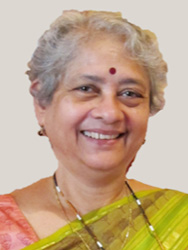Bringing bioethics to health care practice in India
September/October 2021 Volume 20 Number 5
Q&A with Dr. Nandini Kumar
 Dr. Nandini Kumar
Dr. Nandini Kumar
Dr. Nandini Kumar completed a medical degree and post-graduate Diploma in Clinical Pathology from India’s Trivandrum Medical College, where she also received training in gastroenterology. Later, she participated in the first cohort of Fogarty's research ethics training program in 2001. While at the Indian Council of Medical Research, she received a Fogarty grant to establish a national bioethics training program and helped formulate India’s national research ethics guidelines. She is also Steering committee member of WHO’s Strategic Initiative for Developing Capacity in Ethical Review.
What led you to Fogarty?
While at the Indian Council of Medical Research, I was chosen to participate in Fogarty's new bioethics research training program because I'd done bioethics work in the past. With Fogarty support, I completed a master’s course at the University of Toronto. We studied the philosophical and historical approaches to bioethics, regulatory codes and case studies that illustrated the complexity of bioethics research issues. As trainees we felt that we were given every opportunity to develop as bioethicists.
For example, one of the exercises was to write a grant to establish a bioethics training program at home. It was a challenge—the application process was unfamiliar to me. But I knew that India could really benefit and I also knew that my position at the Council, the apex of Indian biomedical research, was the best ground in which to initiate bioethics training. Some prestigious people in our biomedical community were already talking about ethics, so I asked them if I could use parts of their programs for my project. I never imagined they would encourage me, but they did and that helped. Writing that grant became a stepping stone for me, another important lesson from my training.
How did you begin ethics training in India?
I thought very seriously about how to train people in a way that is suitable to India. The training was a step-by-step “upscaling” process. First, we held one-day workshops. Then we held three-day workshops and that evolved into five-day workshops, five-week training programs and eventually degree programs. Researchers are spread out across India and some cannot travel or take a leave from their jobs for long-term training. My thought was that our program could encourage mentorships and then when trainees returned home, both trainee and mentor could work together to plan bioethics programs and workshops.
And that happened in many regions. My program was meant for mid-career people but one of our trainees was a medical college dean who then started a two-year diploma program. Other trainees innovated in smaller ways.
Did the pandemic influence Indian bioethics?
We received a large number of proposals related to COVID-19 and this led to changes at the Ministry of Ayurveda, Yoga, Unani, Siddha, Sowa-Rigpa and Homeopathy (AYUSH). I was chair of that ministry’s safety monitoring group and, during COVID, the concept of data safety and evidence was applied to traditional medicine for the first time. It used to be said that our plants don’t have safety issues because they’ve been used for centuries, but we required evidence around claims related to COVID drugs. So, you could say the pandemic led to an integration of ideas between modern and traditional medicine. And the Ministry of AYUSH actually came out with two products to use for mild to moderate COVID cases. Another problem was: How exactly do ethics committees review COVID proposals? With everything online, scientists had to produce certificates proving they’d received all the necessary training in ethics. You could say COVID compelled investigators to become more sensitized to ethics.
What impact has ethics training had?
I’m very happy to announce that India recently launched a Good Clinical Practice (GCP) program—certified by the International Organization for Standardization—which is the first of its kind. The initiative includes standard principles of ethics and GCP within the Indian context. It is a train-the-trainer program so, importantly, people will have to pass an exam and only then will they be able to train others. So just like there are certified ethics committee members, we will also have certified professionals for GCP. That is a very big step.
More Information
To view Adobe PDF files,
download current, free accessible plug-ins from Adobe's website.
Related Fogarty Programs
Related World Regions / Countries
Related Global Health Research Topics